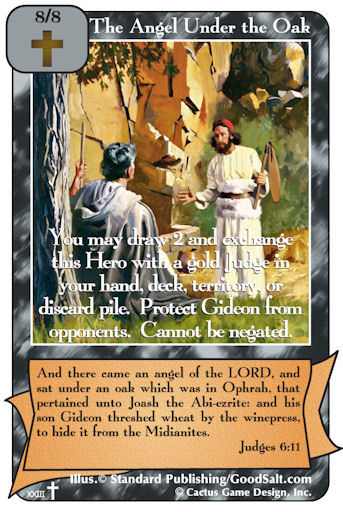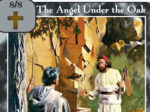Join Taylor in a devotional discussing the significance of the Angel Under the Oak.

It’s the story of God’s call of Gideon to lead the Isrealites out of the oppression from the Midianites. But what do the details of the story tell the ancient reader that we might gloss over and miss today? There are two details that I’d like to focus on with the story of the Angel under the oak. The first has to do with the tree. The second has to do with the Angel.
The detail that the Angel of the LORD was sitting under an oak tree is important to note. In ancient Israelite religion, oak trees were considered sacred and became associated with an encounter with Yahweh or a divine revelation. By telling the reader that the Angel of the LORD was sitting under the oak tree, the author is telegraphing that Gideon was about to have an encounter with Yahweh.
Which leads me to the second detail, the Angel of the LORD, or more literally translated, the Angel of Yahweh. In English translations of the Bible, “the LORD” in all caps like that indicates the use of God’s name, Yahweh. Anytime we see “the LORD” we can read “Yahweh”. The question is, who is the Angel of Yahweh? Let’s look at the rest of the passage to find some more details that will help us determine what is happening.
12 And the angel of the LORD appeared to him and said to him, “The LORD is with you, O mighty man of valor.” 13 And Gideon said to him, “Please, my lord, if the LORD is with us, why then has all this happened to us? And where are all his wonderful deeds that our fathers recounted to us, saying, ‘Did not the LORD bring us up from Egypt?’ But now the LORD has forsaken us and given us into the hand of Midian.” 14 And the LORD turned to him and said, “Go in this might of yours and save Israel from the hand of Midian; do not I send you?” 15 And he said to him, “Please, Lord, how can I save Israel? Behold, my clan is the weakest in Manasseh, and I am the least in my father’s house.” 16 And the LORD said to him, “But I will be with you, and you shall strike the Midianites as one man.” 17 And he said to him, “If now I have found favor in your eyes, then show me a sign that it is you who speak with me. 18 Please do not depart from here until I come to you and bring out my present and set it before you.” And he said, “I will stay till you return.”
19 So Gideon went into his house and prepared a young goat and unleavened cakes from an ephah of flour. The meat he put in a basket, and the broth he put in a pot, and brought them to him under the terebinth and presented them. 20 And the angel of God said to him, “Take the meat and the unleavened cakes, and put them on this rock, and pour the broth over them.” And he did so. 21 Then the angel of the LORD reached out the tip of the staff that was in his hand and touched the meat and the unleavened cakes. And fire sprang up from the rock and consumed the meat and the unleavened cakes. And the angel of the LORD vanished from his sight. 22 Then Gideon perceived that he was the angel of the LORD. And Gideon said, “Alas, O Lord GOD! For now I have seen the angel of the LORD face to face.” 23 But the LORD said to him, “Peace be to you. Do not fear; you shall not die.” 24 Then Gideon built an altar there to the LORD and called it, The LORD Is Peace. To this day it still stands at Ophrah, which belongs to the Abiezrites.
Jdg 6:12–24.
Here we have the Angel of Yahweh appearing to Gideon. As Gideon is conversing with the Angel of Yahweh, Yahweh begins speaking with Gideon. Now things get interesting. Gideon brings Yahweh a gift offering and presents it to the Angel of Yahweh. The Angel of Yahweh consumes the gift offering with fire. This is a subtle hint that the Angel is not who Gideon first thought. As soon as the Angel accepts the gift offering and leaves, Gideon realizes that he was no ordinary angel. He realizes that it was the Angel of Yahweh, the physical appearance of Yahweh Himself. That is why Gideon was afraid. It was a common belief of the Israelites that seeing Yahweh face to face could be deadly.
Then, another strange detail, Yahweh was still there and reassured him that he would not die. So, we have two strange details in one passage. The Angel is identified as the visible Yahweh. The invisible Yahweh is also present.
From the Faithlife Study Bible:
Yahweh and the Angel [of Yahweh] can be simultaneously—but separately—present (Judg 6).
This is one of the many passages in the Old Testament that indicated the Godhead theology that gets more explicit in the New Testament. The Trinity wasn’t a doctrine created by Christians. It was common for the Jews before and during the life of Jesus to believe in at least two of the three persons in the Godhead. It was known as “Binitarian Monotheism” or “the two powers of heaven”. Trinitarian theology is woven throughout the Old Testament and they were well aware of the complexity of God. Gideon experienced it first hand.
I believe that this, and other passages, show how Yahweh, the God of the Bible, not only gives us revelation of who He is in the New Testament through Jesus, but that he gave glimpses of Himself in the Old Testament as well. It fascinates me. Even more than fascinating, it shows how God has always been personally involved with His relationship with humanity from beginning to end, from Genesis to Revelation. He is never changing and always faithful.
We may not have an experience like Gideon had, but we have something better. We are in the age of the new covenant. We have the Spirit of Jesus Christ Himself to dwell within us. Believers are His body on earth. We offer our lives to Jesus as our gift offering. And God reassures us even in the darkest times during this age as we wait for Christ’s return, that we have peace in Him. We have been saved from the oppression of the kingdom of darkness. And we have victory in Him! That is good news!
NOTE: Both the Faithlife Study Bible and The Lexham Bible Dictionary are available for free on the “Faithlife Study Bible” app. Search for it on your mobile device app store and you can access them for free.
Sources:
Sacred Trees in Israelite Religion, Michael S. Heiser, Faithlife Study Bible (Bellingham, WA: Lexham Press, 2012, 2016)
Old Testament Godhead Language, Michael S. Heiser, Faithlife Study Bible (Bellingham, WA: Lexham Press, 2012, 2016)
The Holy Bible: English Standard Version (Wheaton, IL: Crossway Bibles, 2016), Jdg 6:12–24
To buy singles, sealed product, and other gaming supplies mentioned, please visit our sponsors!
